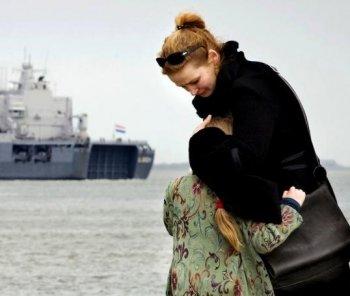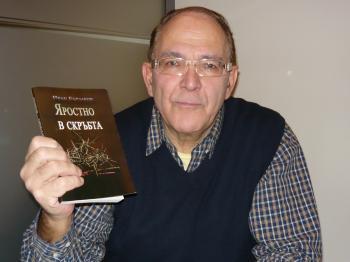“Bulgarian factories lost approximately 85 million Euros due to the Russian gas crisis,” Bulgarian minister of economy and energy Petur Dimitrov told journalists last week. Dimitrov said these were direct losses that impacted factories in Bulgaria, and the losses were the result of the crisis involving the delivery of Russian gas through Ukraine.
“It is truly a catastrophic event to lose 85 million in just 10 days as a result of political actions and not of natural disaster or the world economic crisis,” said Dimitrov during a press conference. He added that Bulgaria has all the reason to expect full support of the European Union (EU) in new gas projects for which the country is trying to apply. Dimitrov also said there is a possibility that Bulgaria will take other compensatory measures for its losses, such as restarting one of the two suspended nuclear reactors it shut down, which was a requirement for the country to join the EU.
Bulgaria has suffered most from the “Cold War”--the name given by the media for the row between Ukraine and Russia over natural gas delivery. At 3:30 am on Jan. 6, the supply of natural gas at the Ukranina-Rumanin border entering the Bulgargaz was suspended. Bulgargaz is the largest Bulgarian natural gas distributing company.
Consequently, the supply of gas toward Greece, Turkey, and Macedonia was also interrupted. In just hours the gas crisis had spread. Bulgaria was the only country among the three which has a single pipeline and no other sources of gas supply. The country has a small gas mining plant that only provides minimal quantities to meet minor demands.
During the crisis, the heating plants in Bulgaria stopped supplying heat and hot water to homes. Schools, kindergartens, hospitals, and institutions remained cold. A state of emergency was declared in many areas, children were removed from school, and mayors issued orders in order to minimize the use of electricity to reduce the energy load.
On Jan. 18, Dimitrov announced that suppliers of gas to Bulgaria through the pipline from Ukraine--‘Bulgargas’ and ‘Bulgartransgas’--will seek compensation for losses suffered by their suppliers, and that Bulgaria will declare its clear position that it wants to be in a market without intermediaries in the future.
Bulgarian political parties and President Georgi Parvanov have demanded the restart of the suspended nuclear reactors. The closings of these reactors were a condition for Bulgaria’s acceptance into the EU. Bulgaria was compensated by the EU for closing the reactors. The European Commission has stated it is against Bulgaria restarting the nuclear reactors
Bulgarian politicians are now pushing to launch new projects or complete current ones involving alternative fuel supplies. One such project is called the Nabucco natural gas pipeline which will deliver gas from Turkey to Austria through Bulgaria, Romania and Hungary. The project appeared to be low priority for the European Commission during the last few years, but after the gas crisis, active work on the Nabucco pipeline has begun and the project is scheduled to be completed in 2013.
European leaders, including the Bulgarian Prime Minister Sergey Stanishev, gathered at a summit in Bucharest, Hungary on Jan. 25 and 26 to discuss possibilities for the Nabucco pipeline. Stanishev noted that the project will be mutually beneficial to oil and gas producers like Azerbaijan as well as for the consumer nations of European Union.
“It is truly a catastrophic event to lose 85 million in just 10 days as a result of political actions and not of natural disaster or the world economic crisis,” said Dimitrov during a press conference. He added that Bulgaria has all the reason to expect full support of the European Union (EU) in new gas projects for which the country is trying to apply. Dimitrov also said there is a possibility that Bulgaria will take other compensatory measures for its losses, such as restarting one of the two suspended nuclear reactors it shut down, which was a requirement for the country to join the EU.
Bulgaria has suffered most from the “Cold War”--the name given by the media for the row between Ukraine and Russia over natural gas delivery. At 3:30 am on Jan. 6, the supply of natural gas at the Ukranina-Rumanin border entering the Bulgargaz was suspended. Bulgargaz is the largest Bulgarian natural gas distributing company.
Consequently, the supply of gas toward Greece, Turkey, and Macedonia was also interrupted. In just hours the gas crisis had spread. Bulgaria was the only country among the three which has a single pipeline and no other sources of gas supply. The country has a small gas mining plant that only provides minimal quantities to meet minor demands.
During the crisis, the heating plants in Bulgaria stopped supplying heat and hot water to homes. Schools, kindergartens, hospitals, and institutions remained cold. A state of emergency was declared in many areas, children were removed from school, and mayors issued orders in order to minimize the use of electricity to reduce the energy load.
On Jan. 18, Dimitrov announced that suppliers of gas to Bulgaria through the pipline from Ukraine--‘Bulgargas’ and ‘Bulgartransgas’--will seek compensation for losses suffered by their suppliers, and that Bulgaria will declare its clear position that it wants to be in a market without intermediaries in the future.
Bulgarian political parties and President Georgi Parvanov have demanded the restart of the suspended nuclear reactors. The closings of these reactors were a condition for Bulgaria’s acceptance into the EU. Bulgaria was compensated by the EU for closing the reactors. The European Commission has stated it is against Bulgaria restarting the nuclear reactors
Bulgarian politicians are now pushing to launch new projects or complete current ones involving alternative fuel supplies. One such project is called the Nabucco natural gas pipeline which will deliver gas from Turkey to Austria through Bulgaria, Romania and Hungary. The project appeared to be low priority for the European Commission during the last few years, but after the gas crisis, active work on the Nabucco pipeline has begun and the project is scheduled to be completed in 2013.
European leaders, including the Bulgarian Prime Minister Sergey Stanishev, gathered at a summit in Bucharest, Hungary on Jan. 25 and 26 to discuss possibilities for the Nabucco pipeline. Stanishev noted that the project will be mutually beneficial to oil and gas producers like Azerbaijan as well as for the consumer nations of European Union.


